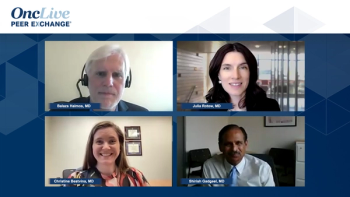
Panelists discuss how they currently utilize emerging ctDNA platforms for high-risk patients and explore whether these advancements will soon become standard practice in clinical decision-making.

Your AI-Trained Oncology Knowledge Connection!


Panelists discuss how they currently utilize emerging ctDNA platforms for high-risk patients and explore whether these advancements will soon become standard practice in clinical decision-making.

Panelists discuss how the field aims to translate lessons learned from metastatic treatment into earlier-stage interventions for select patients, sharing their current practices and hopes for future advancements in care.

Panelists discuss how recent insights into delayed resistance mechanisms in EGFR-positive cancers, including the role of combination therapies and improved testing methods, are shaping strategies to better manage and overcome resistance.

Panelists discuss how advancements in targeted therapies and personalized medicine are crucial for addressing the pressing unanswered questions in the management of ALK-positive and BRAF-positive cancers.

Panelists discuss the role of immunotherapy in the treatment landscape for BRAF-positive NSCLC, considering factors influencing the choice between immunotherapy and targeted therapy, emerging therapies, ongoing clinical trials, and approaches to dosing, sequencing, and toxicity management for both ALK and BRAF inhibitors.

Panelists discuss recent data on progression-free survival (PFS) and duration of response (DOR) for BRAF-MEK inhibitor combinations, including encorafenib + binimetinib and dabrafenib + trametinib, while also addressing emerging safety signals, differences in response based on treatment lines, and considerations for dose modifications and sequencing strategies in clinical practice.

Panelists discuss their insights on current and emerging combination strategies in the treatment of BRAF-positive NSCLC, focusing on the integration of targeted therapies, immunotherapies, or both.

Panelists discuss the findings from the ALINA study on adjuvant alectinib vs chemotherapy in resected ALK-positive NSCLC, considering how these results may influence early-stage management, sequencing strategies for ALK inhibitors, and the role of resistance mechanisms in treatment decisions.

Panelists discuss the efficacy of ALK inhibitors in treating brain metastases, referencing data from the REMARK study, the CROWN trial, ALTA-3, and ALTA-1L/brigatinib, among others.

Panelists discuss the circumstances under which they would consider switching patients on different first-line treatments to lorlatinib and outline approaches for CNS surveillance and management in ALK-positive patients.

Panelists discuss how recent data influence treatment choices for ALK-positive NSCLC patients, highlighting specific patient factors that guide decisions and potential concerns regarding the use of lorlatinib as first-line therapy.

Panelists discuss the key findings from the latest data from the CROWN and BRIGHTSTAR studies, emphasizing efficacy end points and comparing the effectiveness of these regimens with that of others in the treatment landscape for ALK-positive NSCLC.

Panelists discuss the importance of molecular testing in NSCLC, particularly for ALK rearrangements, and explore how recent advancements and emerging technologies are shaping first-line treatment selection for ALK-positive patients.
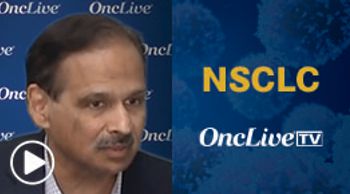
Shirish M. Gadgeel, MD, on long-term follow-up data from MARIPOSA for amivantamab plus lazertinib in first-line EGFR-mutated non–small cell lung cancer.
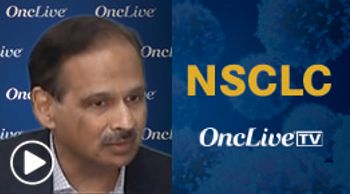
Shirish M. Gadgeel, MD, discusses long-term follow-up data from the MARIPOSA study for patients with EGFR-positive advanced non–small cell lung cancer.
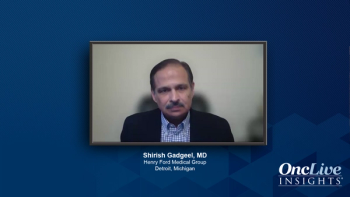
Dr. Shirish Gadgeel discusses the activity of antibody drug conjugates against brain metastases in non-small cell lung cancer based on emerging data, suggesting superiority over chemotherapy.

Dr. Gadgeel reviews the HERTHENA-Lung01 trial results of the HER3 targeting antibody drug conjugate patritumab deruxtecan in EGFR-positive non-small cell lung cancer.

Dr. Shirish Gadgeel discusses recent EVOKE-2 trial results showing promising response rates with sacituzumab govitecan combined with pembrolizumab for metastatic non-small cell lung cancer.
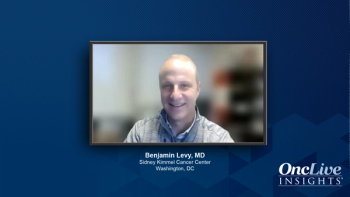
Benjamin Levy, MD, reviews clinical data on Dato-DXd in patients with advanced NSCLC and their practical implications.

Benjamin Levy, MD, reviews clinical data on T-DXd in HER2 mutated advanced NSCLC and their practical implications.

Benjamin Levy, MD, discusses the role of molecular testing in patients with advanced NSCLC.

Shirish M. Gadgeel, MD, discusses 2-year follow-up data from the phase 1/2 KRYSTAL-1 trial in patients with advanced or metastatic non–small cell lung cancer harboring KRAS G12C mutations.

Shirish M. Gadgeel, MD, discusses the efficacy of adagrasib in patients with KRAS G12C–mutated non–small cell lung cancer and central nervous system metastases.
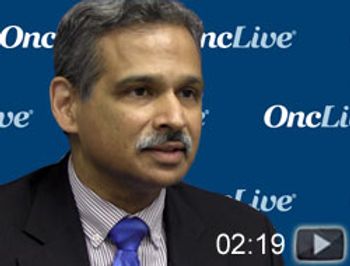
Shirish Gadgeel, MD, medical oncologist, leader of the Thoracic Oncology Multidisciplinary Team at Karmanos Cancer Institute, Wayne State University, discusses the KEYNOTE-021 study, which is examining the combination of pembrolizumab (Keytruda) and chemotherapy as a potential treatment for patients with non–small cell lung cancer.

Published: August 25th 2022 | Updated:
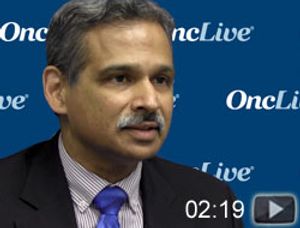
Published: August 23rd 2016 | Updated: